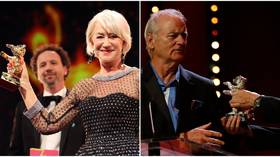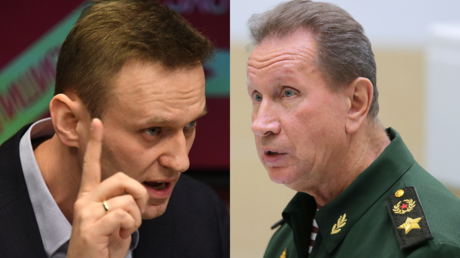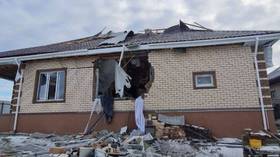Lazy Western caricatures claiming Russian media is overwhelmingly ‘state-run’ are out of date – the internet is where it’s at now

If you rely on Western media to inform yourself about Russia, you may think Russians are being brainwashed by the state TV zombie box. But in the real world, there’s been a huge shift online, where content’s largely unregulated.
Of course, a favourite trope of Western analysts is that the Russian press is completely controlled and guided by the state, feeding into a single narrative to convince those both at home and abroad of the Kremlin’s viewpoints. This is often used, for example, to explain away the fact that the pro-Western liberal opposition has such limited support: “They don’t appear on state TV, so people don’t know about them,” is the typical refrain.
This purposely ignores the country’s media plurality, and grossly misleads the Western public and, even more worryingly, their decision makers, who rely on press and think tank reports on Russia to inform themselves about the country – or unknowingly misinform themselves, as is quite often the case.
While much of Russian television is indeed owned by the state, in some shape or form, the real boom in independent media is in an entirely different space: the internet. With the growth in popularity of social networks, a landscape has emerged in which some of the most recognizable and well-respected media figures have risen to the top without being on TV at all.
For the under-30s, YouTube has become a one-stop-shop for news, entertainment, and education. While, in the past, the pinnacle of a broadcasting career might have been to host a TV show on Russia’s Channel One, the country’s celebrities now look to be interviewed by the likes of Yury Dud (who has 7.82 million subscribers), whose internet fame has gone so far that he can now be seen in adverts on regular television.
YouTube has also enabled the growth of anti-establishment figures, whose reach was previously limited by the willingness of TV executives to give them airtime.
Nowadays, Nikolay Sobolev (5.18 million subscribers) can openly mock Russian officials, and Moscow protest leader Alexey Navalny (1.92 million subscribers) can garner countless views by exposing allegedly corrupt government officials. Danila Poperechny (2.99 million subscribers), perhaps the country’s most popular stand-up comic, uploads all his specials to social media, with his latest, mocking top-level political figures such as President Vladimir Putin and Chechen leader Ramzan Kadyrov, garnering almost 9 million views.
The sheer potential of an audience not restricted by gatekeepers has also led to some television figures moving primarily to YouTube for their journalistic output, with former TV host and editor Alexey Pivovarov (1.43 million subscribers) now hosting a news and documentary channel that attracts millions of views.
These examples contribute to a Russian media landscape with a genuine plurality and an environment that cannot simply be dismissed as ‘state-run’.
New sensations
Other YouTubers focus on a certain niche, attracting vast numbers of viewers for their expertise and entertainment value. One such example is Evgeniy Bazhenov, better known by his alias BadComedian. Bazhenov is Russia’s most popular film critic, and primarily focuses his attention on films financed by the Cinema Foundation, a state-backed film distributor that funds and produces Russian content for the silver screen.
Through his pointed criticism of Cinema Foundation-produced work, Bazhenov has made enemies in both the film industry and the Ministry of Culture, and was famously blocked on Twitter by former Culture Minister Vladimir Medinsky.
BadComedian’s most popular YouTube video, which has had more than 23,000,000 views, picks apart the 2017 movie ‘Going Vertical’, directed by Muscovite Anton Megerdichev. It’s an against-all-odds tale, depicting the victory of the Soviet national basketball team over the US at the 1972 Munich Olympics. Bazhenov’s review tore into the film for its historical inaccuracies and mediocre acting, and accused the producers of plagiarizing the 2004 Hollywood blockbuster ‘Miracle’, about the US ice hockey victory over the USSR at the 1980 Olympics.
Most famously, BadComedian’s excoriating review is actually longer than the movie itself.
While picking apart the Cinema Foundation’s production choices, the YouTuber always seems to be asking the same thing: is this really what the government should be spending taxpayers’ money on? Of course, that’s a reasonable question, given the vast amount of cash spent and often not recuperated. The Foundation itself has also asked this in the wake of underperforming flicks, suing the makers of the 2009 fantasy film ‘Abigail’, after it made a 50 million ruble ($672,000) loss.
Despite his constant and cutting criticism of Russia’s film scene, Bazhenov has been allowed by the authorities to flourish as a major critic of the country’s establishment.
Rubbish rankings
BadComedian’s rise to the top on social media hasn’t gone unchallenged by private business, however. In June 2019, Bazhenov was sued by the production company Kinodanz for his overwhelmingly negative review of the movie ‘Beyond the Edge’.
Kinodanz claimed that BadComedian used too many clips of the film, and demanded its removal, claiming a million rubles ($13,500) in compensation. The studio also said it considered the blogger’s review to be tantamount to “spoiling the reputation” of its business.
Bazhenov received mass support online, including from establishment figures such as movie directors Fyodor Bondarchuk and Sarik Andreasyan. Bondarchuk and Andreasyan have been heavily criticized by BadComedian for their artistic output, but nevertheless took his side. The lawsuit was later dropped.
BadComedian's brush with a potentially expensive case has not dampened his spirits for film criticism. Most recently, he reviewed a Cinema Foundation-funded movie called ‘Union of Salvation’, a period drama about the 1825 Decembrist revolt, when imperialist army officers protested against Tsar Nicholas I's assumption of the Russian throne. According to Bazhenov, it’s historically inaccurate and incoherent propaganda, and its production way too expensive, at the cost of almost 1 billion rubles ($13.4 million).
Although he lives in a country supposedly unfriendly to the media, if you believe Western state-funded think tanks (Russia ranks 149th of 180 in Reporters without Borders’ World Press Freedom Index, which is partially bankrolled by the US and French governments), Bahzenov has become just one of a cadre of well-respected anti-establishment voices in the nation’s media landscape. The free, unregulated nature of YouTube has led to a country where the most popular film reviewer, best known interviewer, highest-profile anti-corruption activist, and top comedian are all based on the same platform, outside the reach of the Russian media watchdog Roskomnadzor.
Unlike in China, where YouTube is blocked, and users are forced onto domestically based websites such as Weibo, WeChat and Tencent QQ, which are actively monitored and censored, any Russian can open up social media and watch scathing reviews of government-funded movies, and revel in criticism of establishment figures and their connections to corruption. And all of this is in stark contrast to the picture many Western-based pundits like to paint about the lack of Russian media plurality.
Also on rt.com Russian Youtube cop loses libel caseThe statements, views and opinions expressed in this column are solely those of the author and do not necessarily represent those of RT.

















